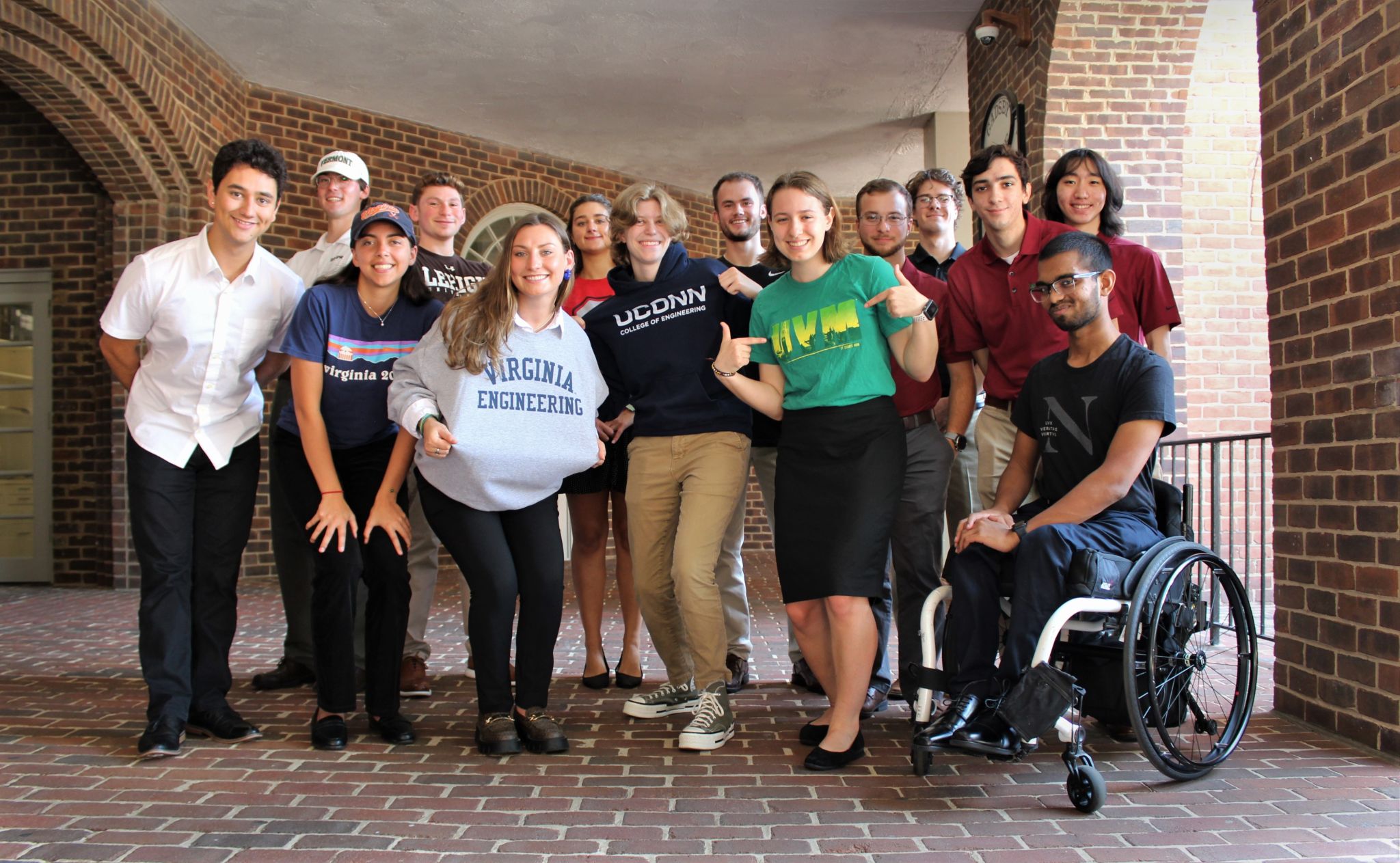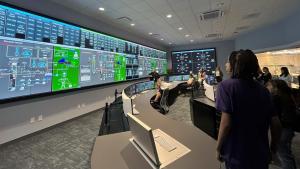
Did you know that the University of Virginia connects students with major employers even before they earn a degree?
The School of Engineering and Applied Science does so through summer internships that offer valuable work experience prior to graduation. Want to learn about working on nuclear reactors? Other types of energy? Or maybe you’re more interested in machines propelled by energy?
UVA Engineering spoke to four rising students in its newest undergraduate degree program, Materials Science and Engineering, about their experiences, starting with two who had the Rolls-Royce of internships.
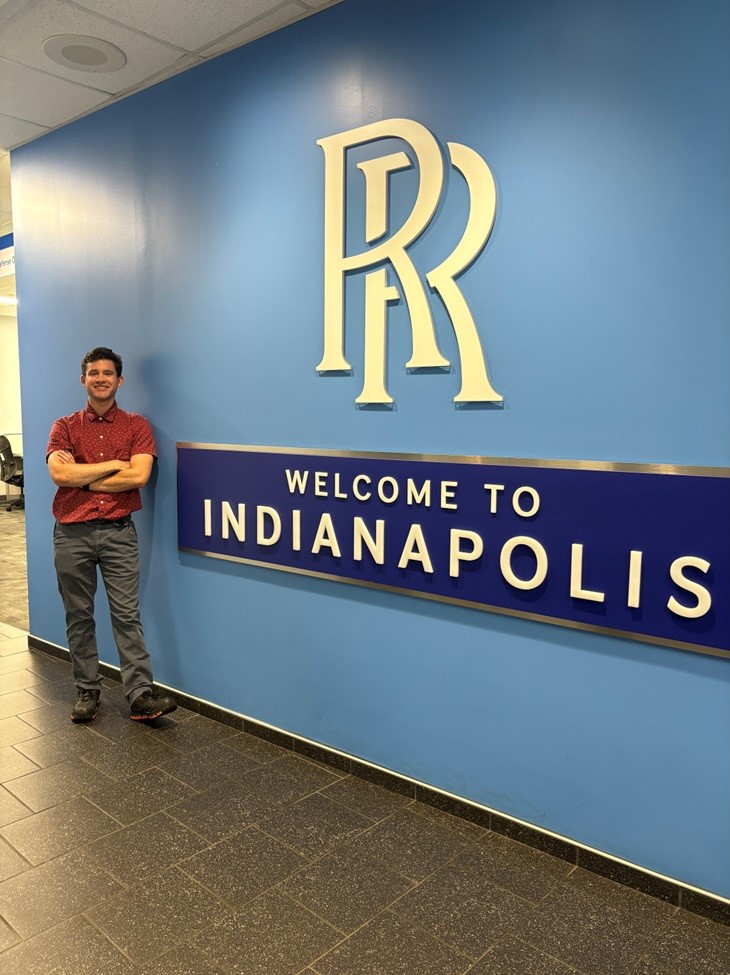
Rolls-Royce, Indianapolis
Intern: Chris Recupero
What were your job responsibilities this summer?
I was involved in a range of research activities focused on developing new materials for Rolls-Royce aircraft engines. At the Indianapolis facility, the materials engineering work is divided into several groups. I was part of the Materials Technology Center, which is dedicated to integrating emerging material technologies into engine production.
My responsibilities included conducting experiments in the lab with high-temperature furnaces, preparing and imaging material samples, and analyzing these samples using imaging and statistical analysis software. After obtaining the experimental results, I presented my findings to the engineering team. Effectively communicating these results was crucial for the continued development and refinement of the materials.
Additionally, one of my other responsibilities was speaking with representatives from various companies regarding a new piece of equipment Rolls-Royce was considering for materials R&D, and I conducted research on the different products offered by potential suppliers.
What did you learn about some of the advanced materials you worked with?
In the classroom and in academic research, it is difficult to get a good understanding of how the development process for new technologies, specifically the development of new materials, works. Particularly, I was largely unaware of the timeline for development and the approvals needed to advance the development into the next stages and implement it into the product. It may seem slow and tedious at times with all the experiments and statistical analyses performed, but quality is paramount, particularly in the aerospace industry.
Can you share any anecdotes about experiential learning moments?
In industry, when you are working for a company where financials are involved in the day-to-day, since financial stability is essential to remain operational, this can influence the work taking place in the lab. One of my projects was to inquire about purchasing a new piece of research equipment from suppliers, and this piece of equipment would be a large capital expense. There were people on the team who had different requirements they wanted fulfilled with the new piece of equipment, and certain requirements would have increased the price dramatically. Breaking down which requirements from multiple users were necessary and were worth the extra expense was a great learning experience. It is difficult to understand how money is involved in the overall operation without experiencing it firsthand.
How did you land the internship? Any advice you can share with other students?
Before applying to the internship, I was aware that Rolls-Royce and UVA had a partnership, and this partnership formally designates UVA as a University Technology Center. Some research at UVA, specifically some of the Department of Materials Science & Engineering research, is directly supported by Rolls-Royce to advance the materials used in aircraft engines. This partnership allows Rolls-Royce to stay at the cutting edge of materials technology while also supporting the education of emerging materials engineers.
The lab I work in, the Advanced High Temperature Research Group, is led by Professor Beth Opila, who is the Rolls-Royce Commonwealth Professor of Engineering. Professor Opila made me aware of the partnership Rolls-Royce has with UVA, so when I went to the career fair in September, I spoke with their representatives, one of whom became my manager for the summer.
For students who are looking for advice on how to land a valuable internship, I would recommend using the connections you have.
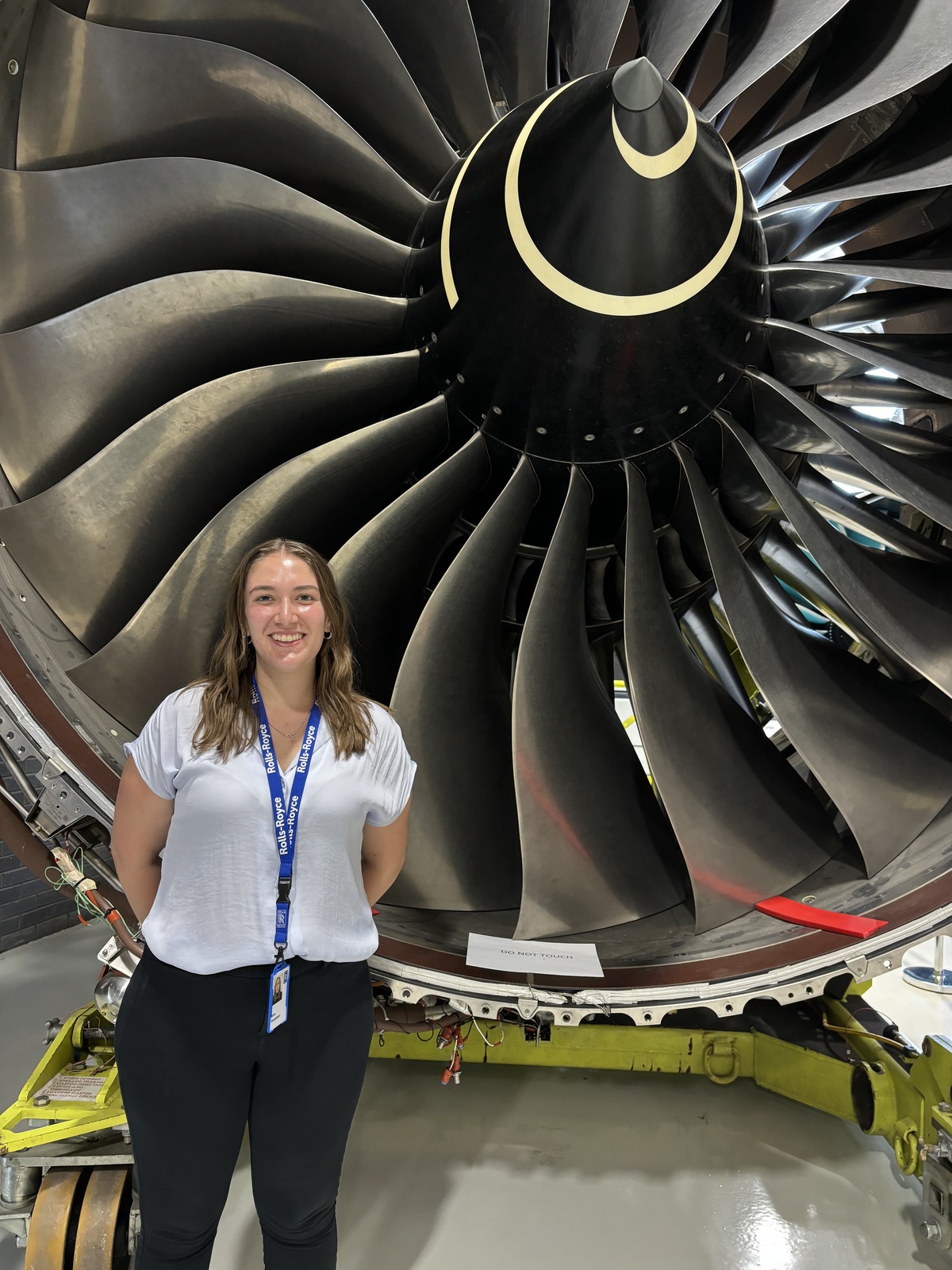
Rolls-Royce, Derby, England
Intern: Alice Pandaleon
What were your job responsibilities this summer?
I worked on a new alloy and processing technique development as well as production support. My responsibilities included investigating properties of a developmental alloy subjected to different methods of processing by analyzing mechanical testing results and microstructure.
Furthermore, I also worked to create reference materials that could be used in future investigations.
What did you learn about some of the advanced materials you worked with?
I gained a lot of exposure to different advanced materials that I hadn’t worked with before, and I learned that materials don’t always work the way we expect them to, which is the whole reason that materials engineers have a job! Using cutting-edge materials introduces a whole range of benefits, as well as a new set of constraints, and it’s our job to learn how to work with these and best suit the needs of a design to its intended use.
Can you share any anecdotes about experiential learning moments?
The biggest lesson I learned from this internship is that if you are able to investigate further, take the time and do it. I was given a set of work studying “fatigue failure” in inertia welds [welding in which none of the product melts] of a new developmental alloy, during which I saw a clear pattern in our results.
Working with some of my other colleagues, we were able to dedicate time to discover where this trend was coming from and what was causing it, which ultimately allowed us to make better informed design decisions.
How did you land the internship? Any advice you can share with other students?
This internship was offered through a partnership between UVA and Rolls-Royce. Actually getting the internship was a fairly standard process of submitting an application followed by two rounds of interviews. My biggest piece of advice is to know yourself, your strengths and weaknesses, and how you work, as this will be important to communicate with your interviewers. Answering a question the best you can and recognizing when you don’t know the answer is just as important.
How do you hope this internship helps your career?
This internship allowed me to experience real industry work and how it differs from what we are taught in the classroom. Knowing your fundamentals and the ideal way to be a materials engineer is important, but industry teaches you that ideal isn’t always possible. I hope to continue building on this knowledge as I enter the workforce.
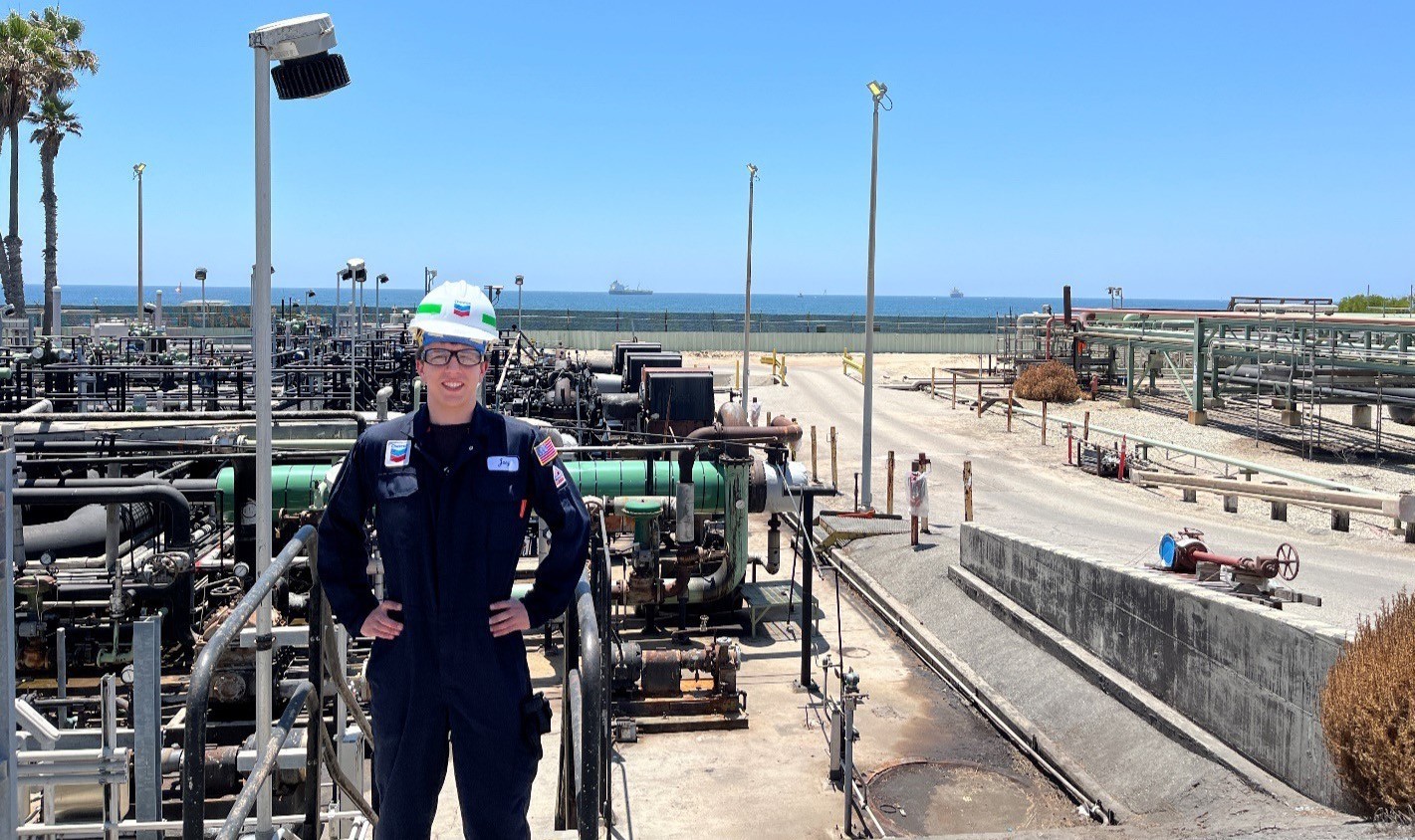
El Segundo Refinery, California
Intern: Joey Giordano
What were your job responsibilities this summer?
I completed a damage mechanisms report review (DMR) in collaboration with the core team. A damage mechanism is a specific way process conditions, metallurgy and stress cause damage to equipment. Each question must be answered thoroughly to ensure the proper safeguards are in place. I completed the refinery’s biggest DMR, which has 81 questions. My DMR report was approved by refinery management and will be reviewed by local regulators.
I also wrote a report on a specific damage mechanism, carbonate cracking. This project allowed me to do a deep dive into a specific damage mechanism and how Chevron manages it. Carbonate cracking has caused minor but expensive issues in refineries across the industry. Although I am not at liberty to discuss the specifics of my report, the purpose was to collect internal and external information into a single document that can be used at all Chevron refineries to better understand how to manage the risks of carbonate cracking. I made recommendations to ensure Chevron is better equipped to deal with carbonate cracking in the future.
The rest of my time was taken up learning more about the refinery and its processes through meetings, discussions with refinery personnel, field walks and shadowing my mentor on some of his more interesting tasks.
What did you learn about some of the advanced materials you worked with?
Cost is always a factor for engineers; if a less expensive material is sufficient for a certain purpose, we will use it. Chevron uses common, inexpensive materials like carbon steels and stainless steels because they are sufficient for containing the high-pressure fluids found in the refining process.
I did work with some more specialized expensive materials such as titanium alloys and Inconel, which are used for extremely high-pressure or temperature containment.
Can you share any anecdotes about experiential learning moments?
I went out into refining units more than 15-20 times throughout the 10-week internship for various purposes. I performed part of an ultrasound inspection on a pipe about 30 feet up in the air.
Inspecting the inside of pipes with devices that are pulled by cords or pushed with pressure is called “pigging” by the industry and the devices are called pigs. (Not joking!) Before I knew this, I overheard a conversation about a pigging inspection and spent several minutes confused and concerned before I got the chance to ask my mentor what was going on. (The term comes from the squealing noise old “pigs” made when drawn through a pipe).
How did you land the internship? Any advice you can share with other students?
I applied to a bunch of internships online. I guess they liked my resume.
Advice to other students (particularly first- and second-years): do materials engineering! Maybe I’m biased, but it’s really cool and it opens doors to many different industries.
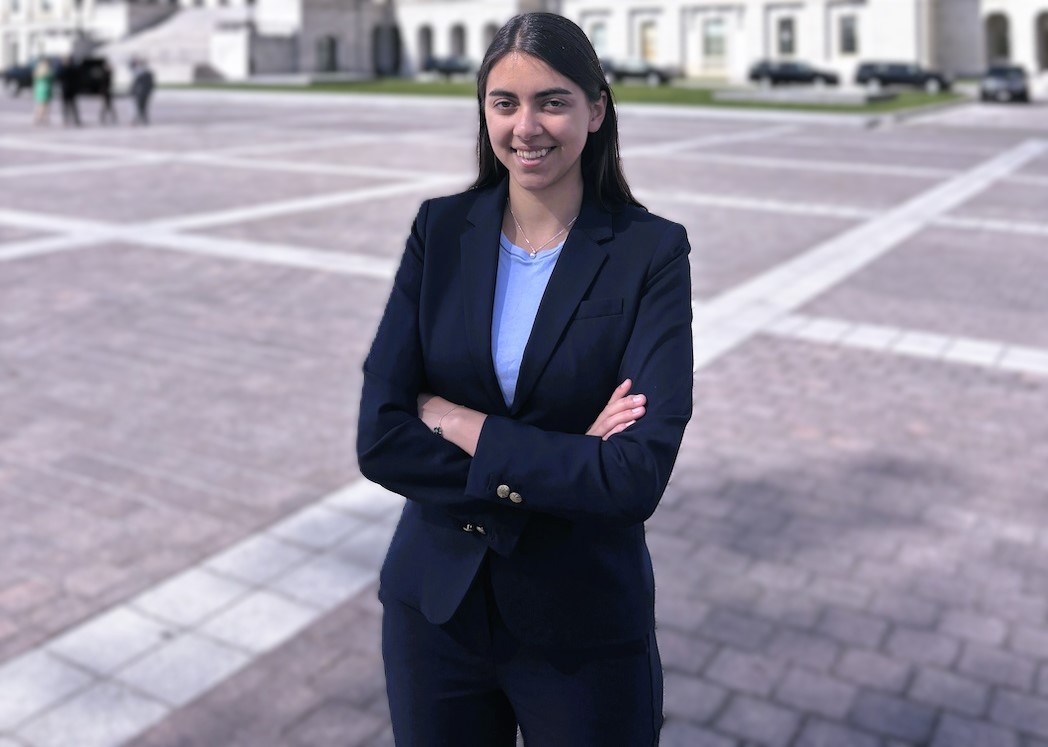
MPR Associates, Alexandria
Intern: Lara Ojha
What were your job responsibilities this summer?
MPR Associates is an engineering consulting firm with clients in the power and energy (nuclear technologies, transmission and distribution, energy storage), federal, and health and life sciences industries. During my time, I have contributed to many projects for domestic and international clients within the nuclear power sector, covering subject areas of mechanical design, plant operation, materials degradation, federal regulation, manufacturing and global supply chain. In each case, I collaborated with exceptionally talented engineers to apply first principles of engineering [breaking down complex systems into their original or fundamental parts] to some of the most challenging problems in new nuclear deployment.
What did you learn about some of the advanced materials you worked with?
One of my focus areas this summer was understanding diffusion and kinetics behavior of a nonmetallic material used in nuclear reactor cores to prevent oxidation, which can cause structural damage over the lifetime of a reactor. I was able to use my understanding of materials fundamentals to develop procedures that can be implemented to reduce core oxidation to acceptable levels.
In another project, I helped develop a program to manage materials degradation in critical nuclear reactor components. The extreme temperature and pressure environment of a reactor, as well as harsh fuel chemical exposure, requires thoughtful, deliberate materials selection for systems to be able to function for the full lifetime of the reactor. While working on this program, I got to travel to the client in Texas and tour the site where the reactor is going to be built.
Can you share any anecdotes about experiential learning moments?
As a part of working on projects for clients, I have been able to produce deliverables such as a specification defining functional requirements for manufacturing a first-of-its-kind heat exchanger, presentations on reactor operation recommendations, and memos summarizing critical materials information, which will go to clients to help them tackle current problems.
The most impactful experiences I had were the opportunities I had to travel to client sites to engage with and present to clients directly. In one case, I met with our client’s engineers as well as the client’s manufacturer that had been tasked with fabrication mockups we were helping to coordinate. The back and forth between three different parties transformed into understanding of each other’s goals and coordination of plans. I learned that oftentimes, a face-to-face meeting can be worth a month of back-and-forth email communication. Being an engineer in this setting opened my eyes to the needs and pace of industry.
How did you land the internship? Any advice you can share with other students?
MPR recruits UVA students each fall, and a couple of the employees are UVA MSE grads! I connected with one of these recent grads (who coincidentally used to work in the same lab as I currently do) and was able to discuss what it is like working at MPR before going through the application process. After submitting my application, I had an hour long on-Grounds technical interview and was then invited to tour the Alexandria office for two more on-site interviews. The technical components of the interviews are based in first principles engineering concepts. MPR recruiters also love to see involvement and leadership in engineering organizations.
Regardless of the job or internship, it is always a good idea to be proactive and reach out to introduce yourself and learn more about the position. UVA has a vast alumni network!
